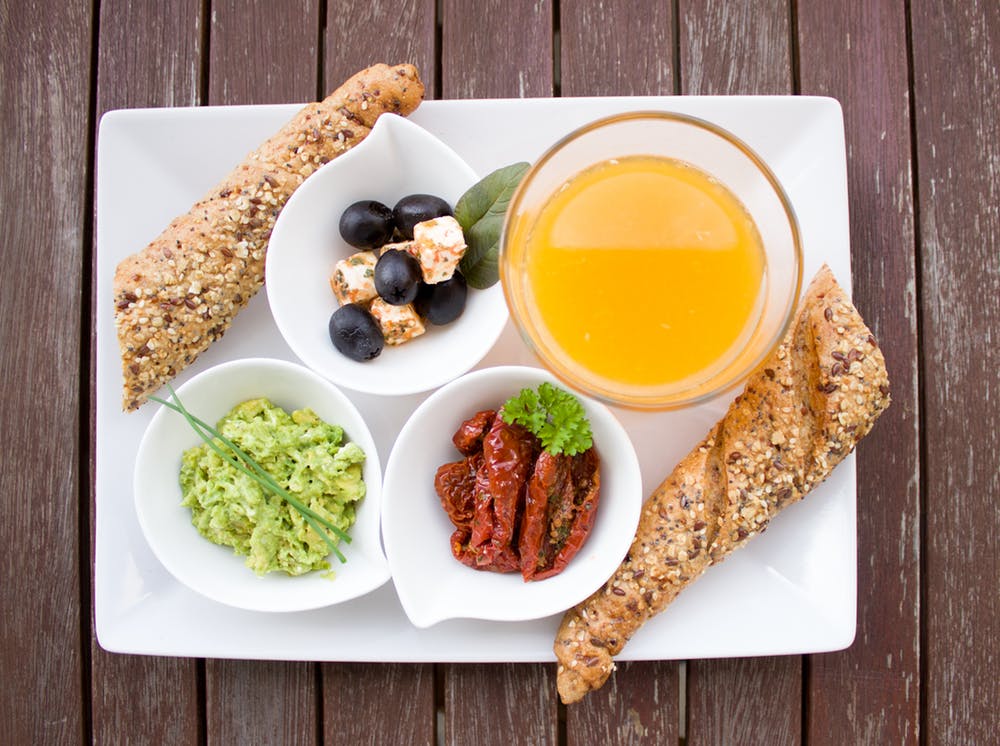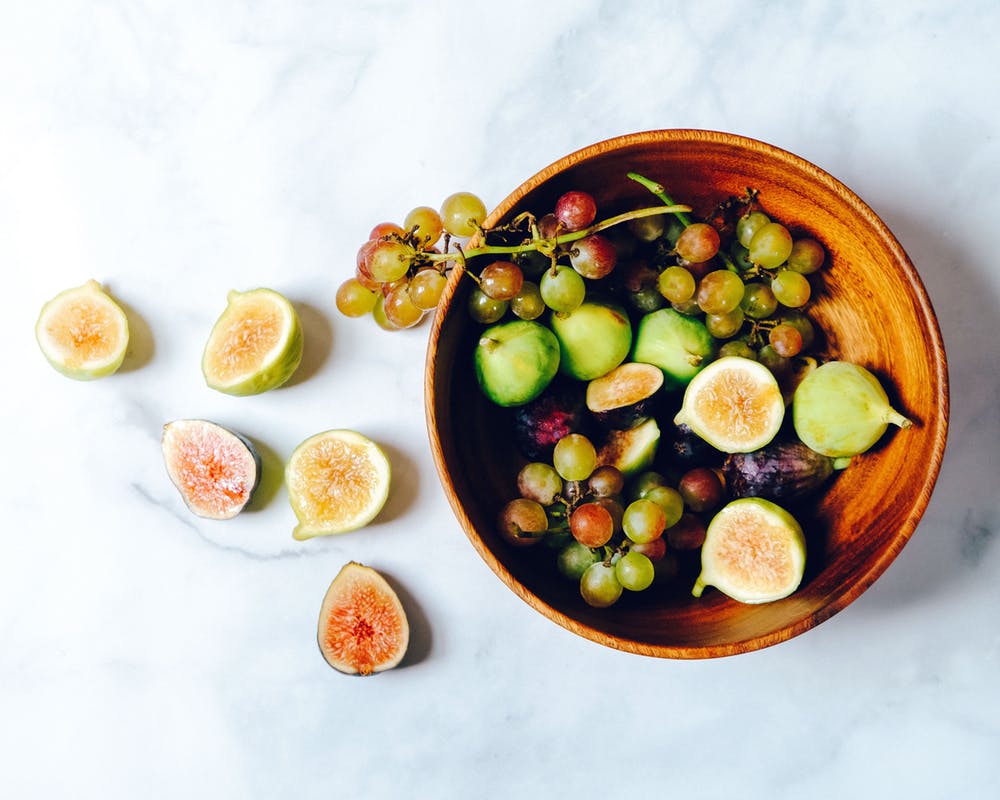I recently shared with you why I’m a big believer of a NO-DIET plan and a balanced lifestyle, but that being said, there are some dietary theories and lifestyles that I believe have good backing, lots of positive research showing their benefits, and are good for you to know more about. It doesn’t mean you have to follow their rules 100%; I actually prefer not to follow any strict rules when it comes to eating. You have to relax and enjoy your food! BUT their principles are extremely beneficial in achieving and maintaining a healthy, balanced diet and lifestyle that can help you reach your healthy goals.
Today I wanted to share a bit about the PRINCIPLES of a MEDITERRANEAN, ANTI-INFLAMMATORY DIET, which I personally apply a lot in my personal life, and recommend as a general starting point with most of my health coaching clients.
Why do I LOVE the Mediterranean diet?
For starters, I’ll be totally honest. I am just naturally drawn to it. Almost everything I really enjoy eating is encouraged on the Mediterranean diet – they’re big on veggies, healthy fats, whole grains, fish/seafood, and even support your glass of red wine and piece of dark chocolate. What’s not to love?!
Personally, I eat the way that makes me feel best. And when I recently decided to “revisit” the principles of the Mediterranean diet, I realized, wow, my day-to-day eating habits basically follow the Mediterranean diet, I just never think about it that way (as I avoid the idea of following any restrictive diet).
What is it all about, and what are the benefits?
The Mediterranean diet is focused on eating fresh, whole foods and keeping your heart healthy.
It promotes eating lots of fresh VEGETABLES, FRUITS, plant-based HEALTHY FATS (including olive oil, avocado, nuts and seeds), tons of HERBS and SPICES, WHOLE GRAINS, FISH and SEAFOOD. Then It suggests eating eggs, chicken and dairy in moderation, and very little red meat.
And like any proper diet, discourages processed foods and sugar, refined oils and refined grains, but otherwise, it doesn’t place a focus on AVOIDING food groups, which I love.
It emphasizes eating a wide variety of local produce, particularly colorful fruits and veggies packed with antioxidants. So it’s essentially a high-antioxidant and anti-inflammatory diet.
The BEST part about it is that it’s pretty relaxed and balanced. It encourages eating all food groups, drinking your water, even occasional coffee, red wine and dark chocolate are totally OK. Then accompany it with a lifestyle of plenty exercise, time with family and friends, time in nature, and of course, enjoying food. (Think of the Italians and Greeks!). Not too complicated.
And it asks that you pack your plate with antioxidant-rich veggies and fruits, eat your fiber, and pour that delicious extra-virgin olive oil liberally to keep your heart (and overall body) healthy!
Benefits:
It helps lower inflammation, and as you may know, inflammation is one of the primary drivers of disease.
I work with a lot of people with both gut issues and hormonal related symptoms. and the Mediterranean diet principles are great for helping with both of these common problems. For example, the Mediterranean diet has been linked to positively impacting bone and muscle mass in post-menopausal women. And as for GUT health, the fact that its VERY rich in fiber due to all the veggies, fruits, whole grains and legumes, nuts, seeds and healthy fats - its amazing for your gut and promotes healthy digestion (and poop)! And of course, a high fiber diet also promotes weight loss.
Additionally, there is research showing that a Mediterranean diet can help with lowering cholesterol and improving cardiovascular health, as well as a reduced incidence of Alzheimer’s, Parkinson’s, and certain cancers.
Plus, the fact that several of the world’s Blue Zones are in the Mediterranean where people have been eating this way for hundreds of years (in a nutshell, areas where people live longest and disease-free) is a huge positive sign (and no surprise!). So if you want to live long and happily, applying Mediterranean Diet principles is a great place to start!
In Summary, What are the Most Common Foods You’ll Be Eating?
Eat In Abundance:
Vegetables: Spinach, Kale, Zucchini, Cucumbers, Broccoli, Cauliflower, Tomatoes, Onions and Garlic, Carrots, Brussels sprouts, Eggplant, etc.
Fruits: All Berries, Apples, Pears, Peaches, Bananas, Oranges (and other citrus fruits), Figs, Grapes, etc.
Nuts and Seeds: Almonds, Walnuts, Macadamia nuts, Cashews, Sunflower seeds, Pumpkin seeds, Sesame seeds, etc.
Legumes: Beans (all), Lentils, Peas, Chickpeas, etc.
Root Veggies: Sweet potatoes and Yam, Turnips, Potatoes, etc.
Whole Grains: Whole Oats, Brown rice, Quinoa, Corn, Buckwheat, Whole-grain bread and pasta.
Fish and Seafood: Branzino/ Sea Bass, Cod, Salmon, Sardines, Trout, Tuna, Mackerel, Shrimp, Oysters, Clams, Mussels, Octopus, Lobster, etc.
Herbs and Spices: Basil, Cilantro, Parsley, Mint, Rosemary, Dill, Sage, Oregano, Nutmeg, Cinnamon, Pepper, Sea Salt, etc.
Healthy Fats: Extra-Virgin Olive Oil, Olives, Avocados and Avocado oil.
Beverages/Other: Water and Herbal Teas/Infusions
Eat In Moderation:
Poultry and Eggs: Chicken, Duck, Turkey, etc. All organic, free-range Eggs (including Chicken, Quail and Duck eggs)
Dairy: Cheese, Yogurt, Greek Yogurt, etc.
Beverages/Other: Red Wine, Coffee and Tea (unsweetened), Dark Chocolate
What does the Mediterranean diet lack?
It doesn’t place much emphasis on eating combinations, when to eat, how to eat, etc. It’s more about keeping it simple: eating your fruits and veggies, fresh fish, some chicken and eggs are OK, as is the occasional (even daily) glass of red wine and dark chocolate. So I love it. BUT if you do have gut conditions, hormonal imbalances or autoimmune conditions, you’ll probably need to dig a bit deeper and find some more personalized support above and beyond just following the Mediterranean diet.
What Are Some Key Takeaways / Steps You Can Start Applying Today to Achieve A Healthier Lifestyle Using the Principles of the Mediterranean Diet?
Eat More Fish. Aim to eat fish once or twice a week, focusing on wild-caught (not factory farmed) fish, and the fattier ones rich in Omega-3’s, like wild Salmon, Mackerel, Sardines and some versions of Sea Bass and Cod. For the latter two, make sure to inquire about their source and potential levels of mercury. Usually cold-water fish and smaller-sized fish are better / contain less potential toxicity.
Snack on Nuts and Seeds and/or include them in your daily breakfast. Try adding a tablespoon of flax and or chia seeds to every breakfast, and use raw almonds, walnuts or cashews as your go-to snack (maybe with a serving of fresh, local fruit.
Have a serving of Fruit every day. Whether it’s with your breakfast, as a snack, as a pre-breakfast (like I prefer) or even as your dessert (instead of the sugar-filled usual dessert!) Remember, fruit is nature’s candy!
Switch Your Oils. Splurge on a really good-quality, delicious tasting Extra Virgin Olive Oil for drizzling on your foods, using in your homemade dressings and sauces, or even for dipping that delicious fresh-baked bread. Buy a good Avocado Oil for high-heat cooking. And of course, minimize (or eliminate) all processed, cheap vegetable oils!
Enjoy Your Food. Chew, Eat Slowly, Appreciate and Savor your food. These principles are just as important as what you place on your plate. Applying principles of a Mediterranean Diet is also about lifestyle, and things like: sitting at the table with a nice table setting, relaxing while eating and savoring your food - are KEY. And I always recommend this to all clients as a key stepping stone to a healthier lifestyle.
Pack every meal with Veggies. And aim to have as much fresh, local, in-season veggies as possible. Also, aim to eat a wide variety, filling your plate with COLOR and different nutrients.
Conclusion:
I view the Mediterranean Diet principles as a happy medium between Vegan and Paleo, and generally a perfect starting point for a healthier, more balanced diet and lifestyle (that will help you live longer and happier)!
Start by applying my 6 tips above, and then contact me if you want to go deeper with a personalized plan.




